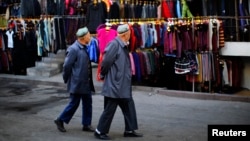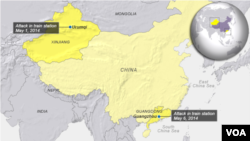BEIJING —
China's remote Xinjiang region is facing growing ethnic unrest, becoming one of Chinese President Xi Jinping's biggest challenges. At a recently concluded top-level meeting on the resource-rich region, Xi outlined policies aimed a promoting more assimilation of Xinjiang's Uighur minorities.
Since Xi took office 14 months ago, a series of violent attacks have claimed the lives of more than 200 people in China. Most of the attacks have occurred in Xinjiang, but the violence also has reached north to Beijing's Tiananmen Square and south to Yunnan province.
Last month, days after attackers tossed explosives into a crowd at a market in Xinjiang's capital, Urumqi, China held its second top-level meeting about the remote region. Xi called for a strong crackdown on terrorism and the promotion of long-term stability. He also said controls would be tightened on religion.
Xi also talked about promoting assimilation, though, between China's Han majority and Uighur minorities.
Migrating Xinjiang's Uighurs
Asian studies senior lecturer James Leibold, of La Trobe University in Melbourne Australia, said an explicit call to shift more Uighurs from Xinjiang's south is significant.
"I think that what is new here is the recognition that money alone is not going to solve the problem, and what is needed is to actually free up these people to seek opportunities, whether they be in Urumqi or Shanghai or in Beijing. That is bold and risky," said Leibold.
He said moving Uighurs to other parts of the country could lead to more ethnic conflict.
"If on the one hand, the state wants to solve this problem of violence and terrorism, but on the other hand their policy [assimilation], at least in my opinion, is going to make that challenge more difficult in the short term," said Leibold.
According to state media reports, Xi told the group that assimilation is crucial to helping forge understanding, safeguarding national unity and solving the problem. He also stressed the need to build a common sense of Chinese destiny among the country's ethnic groups.
There already have been reports of Uighurs living in different parts of the country being forced to return to Xinjiang.
Assimilation issues
The president of the Uyghur American Association, Alim Seytoff, said the effort to promote assimilation will increase ethnic tensions, just as it has done in the past.
"This is not some promotion of inter-ethnic understanding or reconciliation. This is the acceleration of cultural genocide and the forceful assimilation of the Uighur people," said Seytoff. "The problems we are witnessing today are really a result of this kind of forceful assimilation policies."
Seytoff said the only good thing that came out of the meeting was a pledge from the Chinese government to wave high school fees for Uighur children and to help provide each Uighur family with one job.
Seytoff said that although China has poured billions of dollars into developing Xinjiang, that has not always helped Uighurs.
"The Chinese government is not creating jobs for the Uighur people. The Chinese government is creating jobs for the Han settlers," said Seytoff.
During the meeting late last month, Xi said the government's policies were already on the right course. He mentioned measures to help with the development of southern Xinjiang, home to many Uighur minorities.
Recently, state media reported the government plans to boost textile jobs in the region to 1 million by 2020.
Officials also have talked about the need to develop jobs more tailored to the needs of the local population in Xinjiang, and to encourage companies to do more to absorb local labor.
Since Xi took office 14 months ago, a series of violent attacks have claimed the lives of more than 200 people in China. Most of the attacks have occurred in Xinjiang, but the violence also has reached north to Beijing's Tiananmen Square and south to Yunnan province.
Last month, days after attackers tossed explosives into a crowd at a market in Xinjiang's capital, Urumqi, China held its second top-level meeting about the remote region. Xi called for a strong crackdown on terrorism and the promotion of long-term stability. He also said controls would be tightened on religion.
Xi also talked about promoting assimilation, though, between China's Han majority and Uighur minorities.
Migrating Xinjiang's Uighurs
Asian studies senior lecturer James Leibold, of La Trobe University in Melbourne Australia, said an explicit call to shift more Uighurs from Xinjiang's south is significant.
"I think that what is new here is the recognition that money alone is not going to solve the problem, and what is needed is to actually free up these people to seek opportunities, whether they be in Urumqi or Shanghai or in Beijing. That is bold and risky," said Leibold.
He said moving Uighurs to other parts of the country could lead to more ethnic conflict.
"If on the one hand, the state wants to solve this problem of violence and terrorism, but on the other hand their policy [assimilation], at least in my opinion, is going to make that challenge more difficult in the short term," said Leibold.
According to state media reports, Xi told the group that assimilation is crucial to helping forge understanding, safeguarding national unity and solving the problem. He also stressed the need to build a common sense of Chinese destiny among the country's ethnic groups.
There already have been reports of Uighurs living in different parts of the country being forced to return to Xinjiang.
Assimilation issues
The president of the Uyghur American Association, Alim Seytoff, said the effort to promote assimilation will increase ethnic tensions, just as it has done in the past.
"This is not some promotion of inter-ethnic understanding or reconciliation. This is the acceleration of cultural genocide and the forceful assimilation of the Uighur people," said Seytoff. "The problems we are witnessing today are really a result of this kind of forceful assimilation policies."
Seytoff said the only good thing that came out of the meeting was a pledge from the Chinese government to wave high school fees for Uighur children and to help provide each Uighur family with one job.
Seytoff said that although China has poured billions of dollars into developing Xinjiang, that has not always helped Uighurs.
"The Chinese government is not creating jobs for the Uighur people. The Chinese government is creating jobs for the Han settlers," said Seytoff.
During the meeting late last month, Xi said the government's policies were already on the right course. He mentioned measures to help with the development of southern Xinjiang, home to many Uighur minorities.
Recently, state media reported the government plans to boost textile jobs in the region to 1 million by 2020.
Officials also have talked about the need to develop jobs more tailored to the needs of the local population in Xinjiang, and to encourage companies to do more to absorb local labor.





